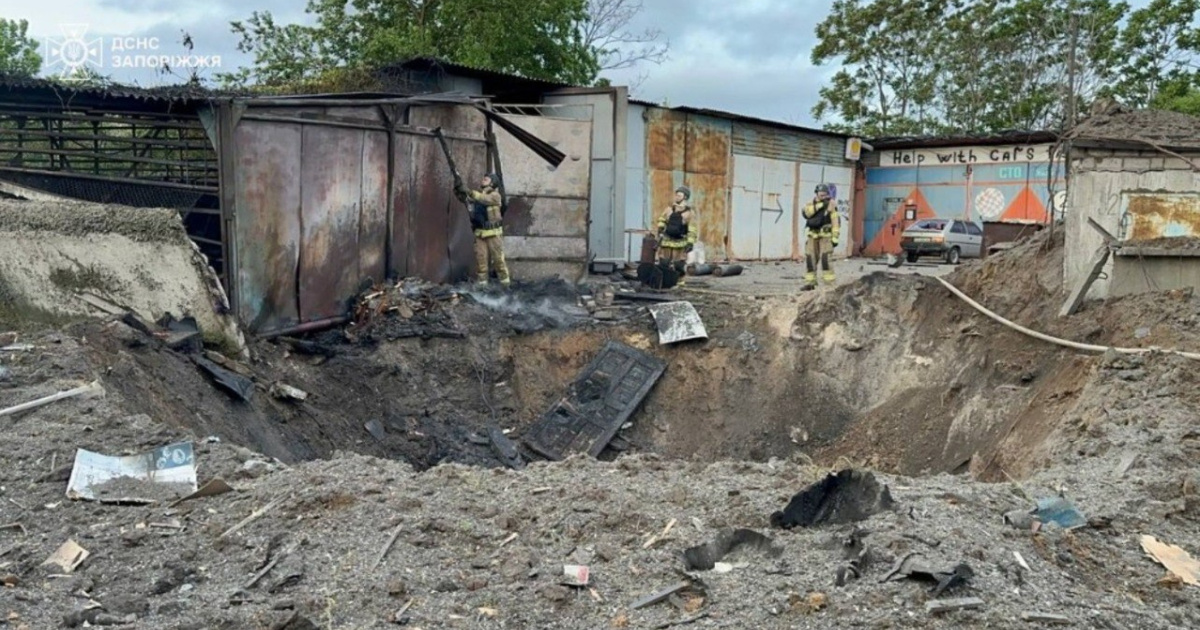
Local self-government in the territories under Ukrainian control but close to the front line in the Zaporizhzhia oblast is a kind of elite special forces, performing highly complex tasks in extremely difficult conditions and ensuring the survival of communities in circumstances where it seems impossible to survive.
The enemy cannot overcome the Makhnovist freedom in Huliaipole
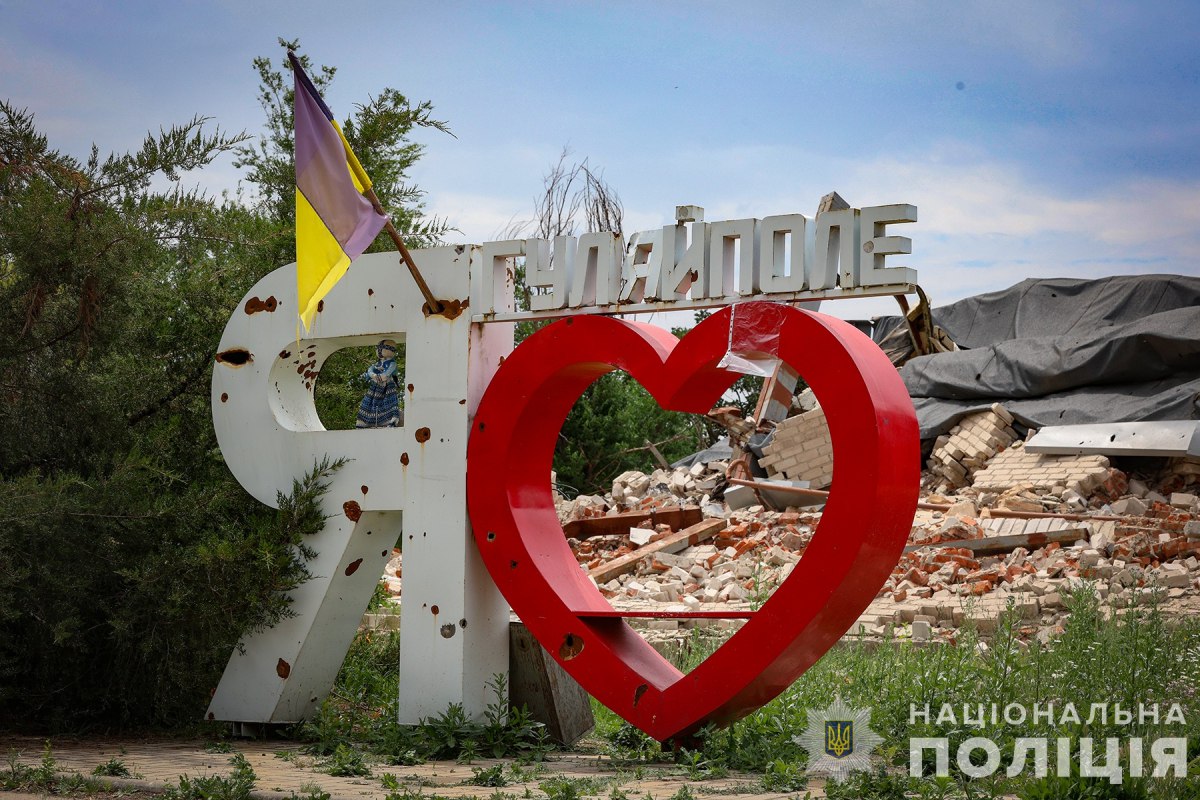
Special people live here. There are few of them left because, due to constant shelling by the russians, particularly in the city of Huliaipole itself, there are almost no intact buildings, and the destruction of infrastructure has led to a lack of more or less civilized living conditions: there is no electricity, gas, or centralized water supply. But some still refuse to leave their homes and hold on to what is theirs. They consider themselves descendants of the famous Makhno, who, in the distant 1920s, founded a free republic on these lands. Back then, their ancestors, under his leadership, did not obey either the Red Army or the White Army. And so now, the people of Huliaipole, strengthening their resistance against the occupiers, once again prove that they are worthy descendants of their forebears.
The russian army is preparing a large-scale offensive on Huliaipole in the Zaporizhzhia oblast, reports BILD. Currently, russian troops are grouping near the town of Polohy to launch an advance from there deeper into the region. Huliaipole is an important strategic and logistical point. If the russians capture it, Ukraine will be under significant pressure. The publication also notes that Ukraine is preparing for counteroffensive actions, which may begin in the fall.
Fierce battles have been ongoing in the direction of Huliaipole since the first days of the large-scale invasion of Ukraine's sovereign territory by occupying forces. The enemy has concentrated considerable manpower and military equipment here. However, in these two and a half years of war, the occupiers have not managed to advance even a step on this front. This is due to the fierce resistance provided by both our military and the local population, under the leadership of the territorial community leaders.
The military conditions require the head of the local community, Serhii Yarmak, to address not only the everyday needs of the citizens but also many additional tasks related to their protection, including supporting the units of the Armed Forces of Ukraine (AFU) that are holding the defense here.
Serhii Yarmak was elected as the mayor of the Huliaipole United Territorial Community of the Polohy district in 2020. This community comprises 32 settlements (with a pre-war population of over 20,000 people), including the administrative center—the town of Huliaipole. Since 2006, he has served as deputy mayor and ran for this leadership position as an independent candidate. Later, the President appointed him as the head of the Huliaipole City Military Administration.
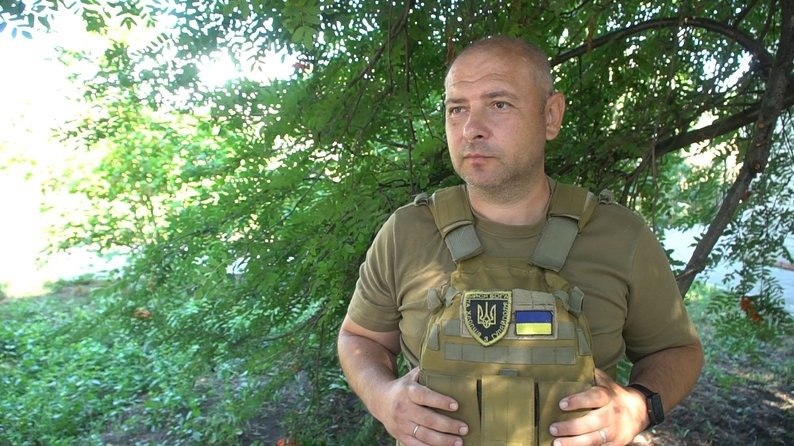
“The extent of the destruction caused by the occupiers in the Huliaipole area is currently impossible to estimate. All critical infrastructure facilities have been damaged: all eight schools, eight kindergartens, hospitals, the city council, and the Pension Fund", - notes Serhii Yarmak. "Regarding apartment buildings, of which we have 49, all of them have sustained various types of damage. Some have damaged roofs, others have lost windows, and there are different types of destruction. As for private homes, around 50% are damaged, and some have been completely destroyed".
The occupiers are literally showering the community's territory with KABs (guided aerial bombs), and enemy drones are constantly dropping explosives. There are dozens of chaotic strikes every day, so buildings here are either completely leveled or damaged by debris.
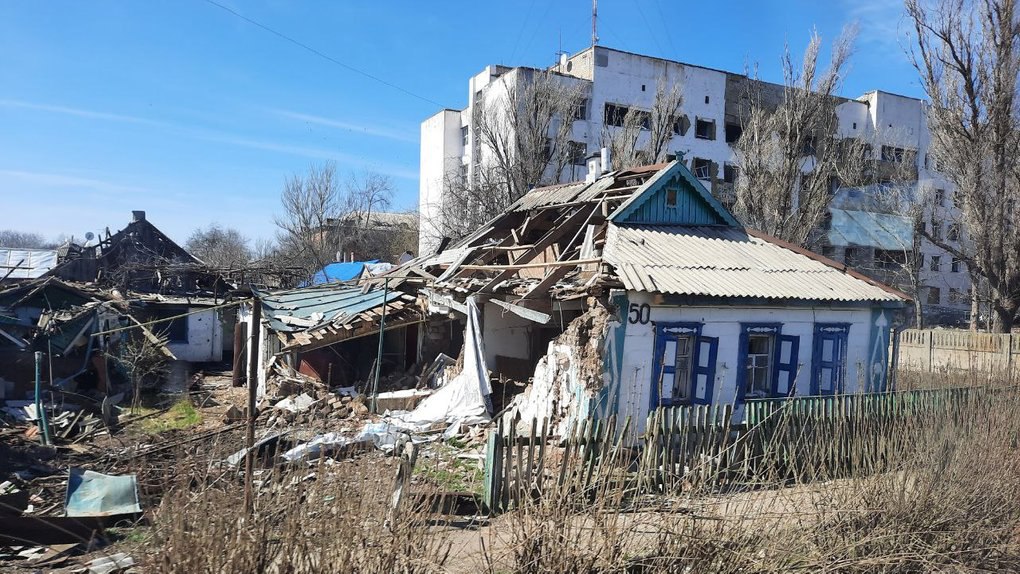
Yet, about 2,300 residents remain in the community. Most of them are over 50 years old and require care and attention. Thus, the local authorities ensure the daily delivery of food, drinking water, and medicine.
"Since March 4, 2022, there has been practically nothing on the territory of the community: no electricity, no gas, no water. But we maintain the operation of public utilities: we collect garbage, deliver water, clean the streets, and carry out other work. All electrical equipment in the Huliaipole community operates on generators, including mobile communication towers and water pumps from wells", - said Serhii Yarmak. "Pharmacies are not operating. Volunteers bring medicines, and we distribute them to people for free. A few kiosks are open, and in the mornings, people can buy what they need".
In addition, the community has managed to establish a social bus route with the help of the "Pidsnizhnyk" humanitarian mission. Three times a week, people can travel for free from Huliaipole to Pokrovske in the Dnipropetrovsk oblast, the nearest settlement where there is electricity, water, and functioning shops.
Local authorities are also helping people with housing restoration.
"Every day, except weekends, we distribute construction materials: tarpaulin, waterproof canvas, film, rails, boards, so people can at least cover their homes from the elements", - explains the head of the territorial community. "Unfortunately, the compensation program for destroyed or damaged housing due to military actions, 'E-Restoration' does not apply to us because the community is located in a combat zone. So, given the situation, we manage with our own resources, relying on volunteers and charitable organizations".
Police officers visit the addresses of damaged homes, document the aftermath of the strikes, provide necessary assistance to the victims, and evacuate residents to safe locations.
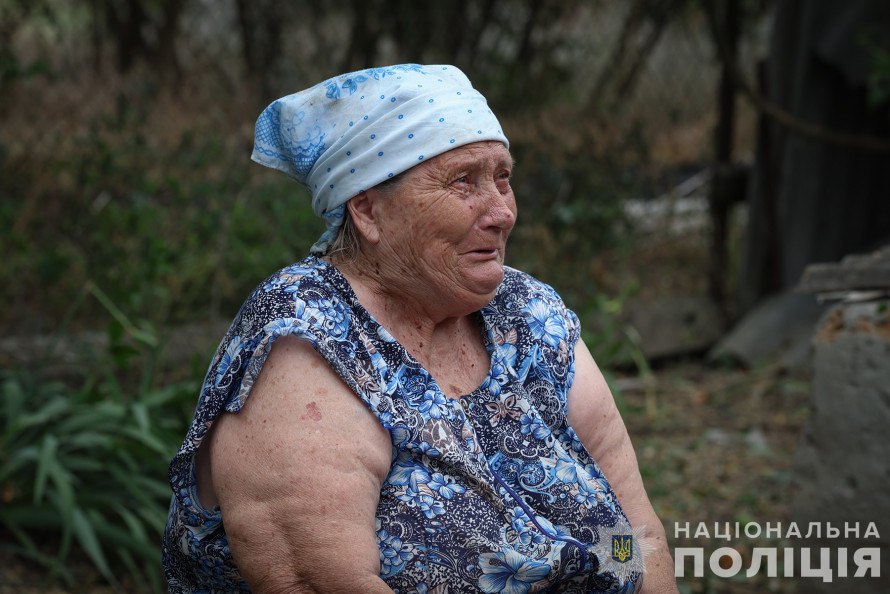
At the home of 75-year-old Nina Ivanivna, the roof was breached, windows were shattered, and property accumulated over the years was almost completely destroyed. This is not the first hit her home has taken, but such extensive damage has never occurred before. Living alone, she is unable to rebuild the house by herself. She said she was very frightened and now fears staying here. The police helped evacuate her to a safe place where she received the necessary assistance.
Supporting internally displaced persons (IDPs) from the Huliaipole community is also within the responsibilities of its leader. Serhii Yarmak cares for all his people, whether they remain in the community or have been forced to relocate to Zaporizhzhia. Assistance is provided by partner organizations.
Recently, the community received a front-end loader from the USAID DOBRE program. Currently, the new equipment is in Zaporizhzhia, helping unload humanitarian aid for the residents of Huliaipole who were forced to leave their homes and settle there.
Additionally, humanitarian aid is being delivered to the community's territory.
According to Serhii Yarmak, the loader is very much needed to clear debris, particularly construction waste, and to fill in trenches and craters.
"We plan to bring the loader to our community's territory when it is safe to do so; for now, we are using older equipment rented for this purpose. There is a lot of work to be done. During the period of military aggression, all our municipal equipment was completely destroyed. We are doing our best to clear the rubble wherever possible. That is why this equipment is crucial for us", - he said.
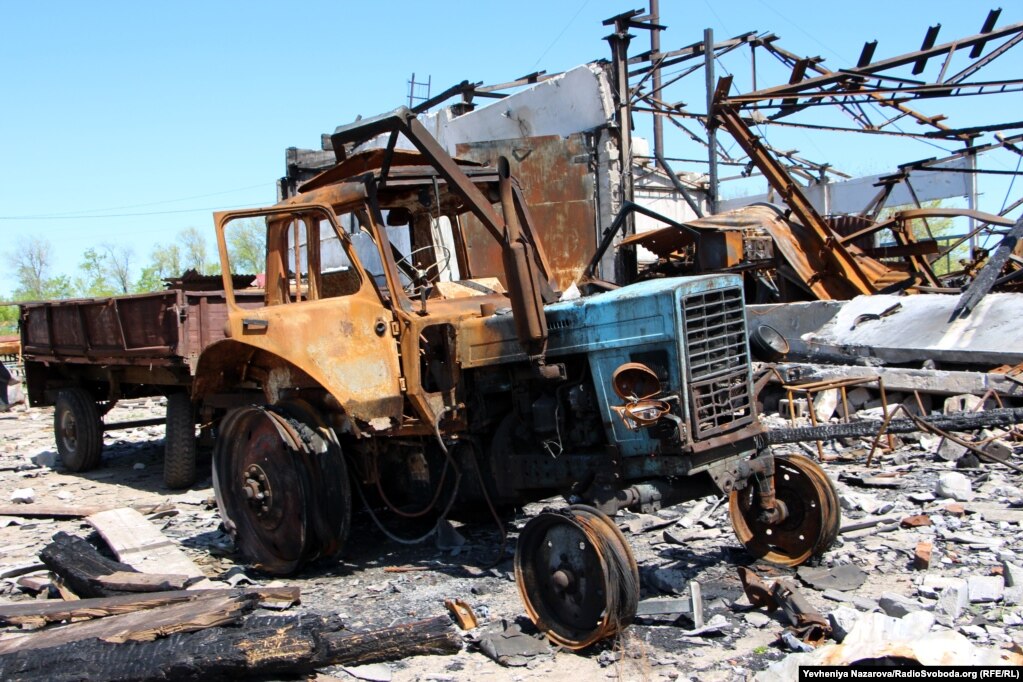
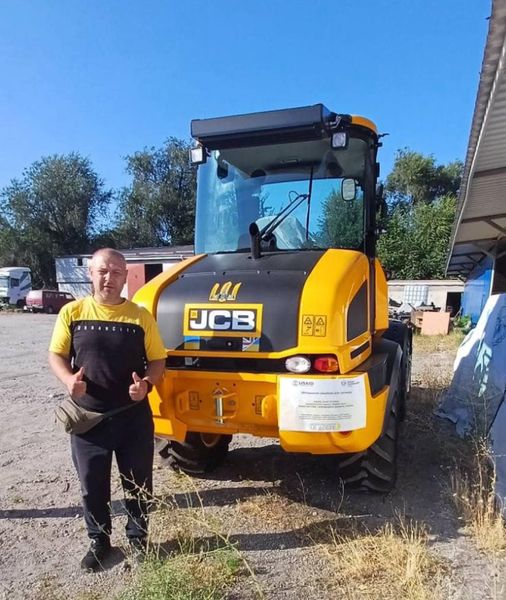
The front-end loader, valued at over three million hryvnias, was provided to the Huliaipole community as part of the comprehensive recovery project of the USAID DOBRE program. Previously, under the rapid response project, USAID DOBRE delivered equipment, tools, and generators to the community.
Kushuhum community mourns the dead, supports the defenders, and is building an underground school
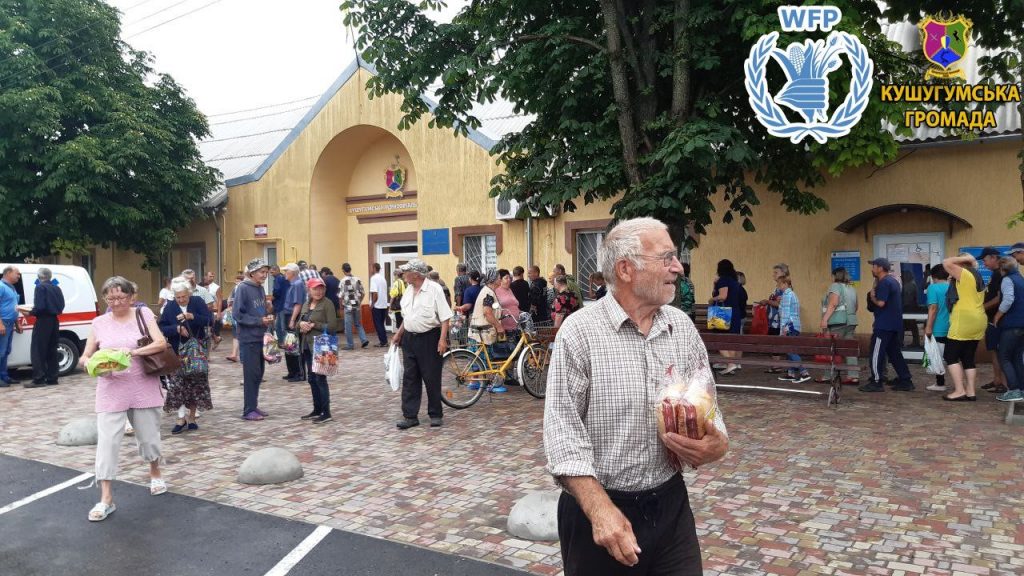
On the evening of August 20, the russian army struck the village of Malokaterynivka, which is part of the Kushuhum community. The occupiers hit the children's café Lavanda. As a result of the strike, a 15-year-old teenager, Dmytro Hrechanyk, died in the hospital. According to the village head, Liudmyla Volyk, the day before, the boy had been excited to receive an invitation to the high school where he was supposed to study. August 21 was declared a Day of Mourning in the Kushuhum community for the deceased.
In total, four people were injured, three of whom were children, confirmed the head of the Zaporizhzhia Oblast Military Administration, Ivan Fedorov. Two of the children are currently in medical facilities. The ages of the injured range from 11 to 17 years. An 18-year-old girl was also injured.
"The russians are targeting cafes, hospitals, and shopping malls to undermine the resistance of the Ukrainian people and to cause dissatisfaction with the government. They want us to turn against each other within the country. These are all tactics of the Soviet KGB. The more discontent there is, the better it is for the enemy. Condolences to the families of the children", - wrote a local resident in a comment on the Day of Mourning announcement on the community's social media page.
"The enemy has begun attacking settlements they previously did not attack", - commented Ivan Fedorov, the head of the Zaporizhzhia OMA. "The intensified shelling may be part of a strategy aimed at destroying the civilian population in areas close to the front line. According to the information and conclusions presented by the military at the Zaporizhzhia OblastDefense Council meeting, there is currently no basis for mandatory evacuation. Nevertheless, evacuation groups from the National Police, rescuers, and volunteers are working promptly and fulfilling every evacuation request from residents wishing to evacuate".
The Kushuhum community sincerely believes in victory, so during one of the sessions of the Kushuhum local village council, it was decided to allocate the entire 2024 income budget, amounting to 40 million hryvnias, to the needs of the Ukrainian Armed Forces.
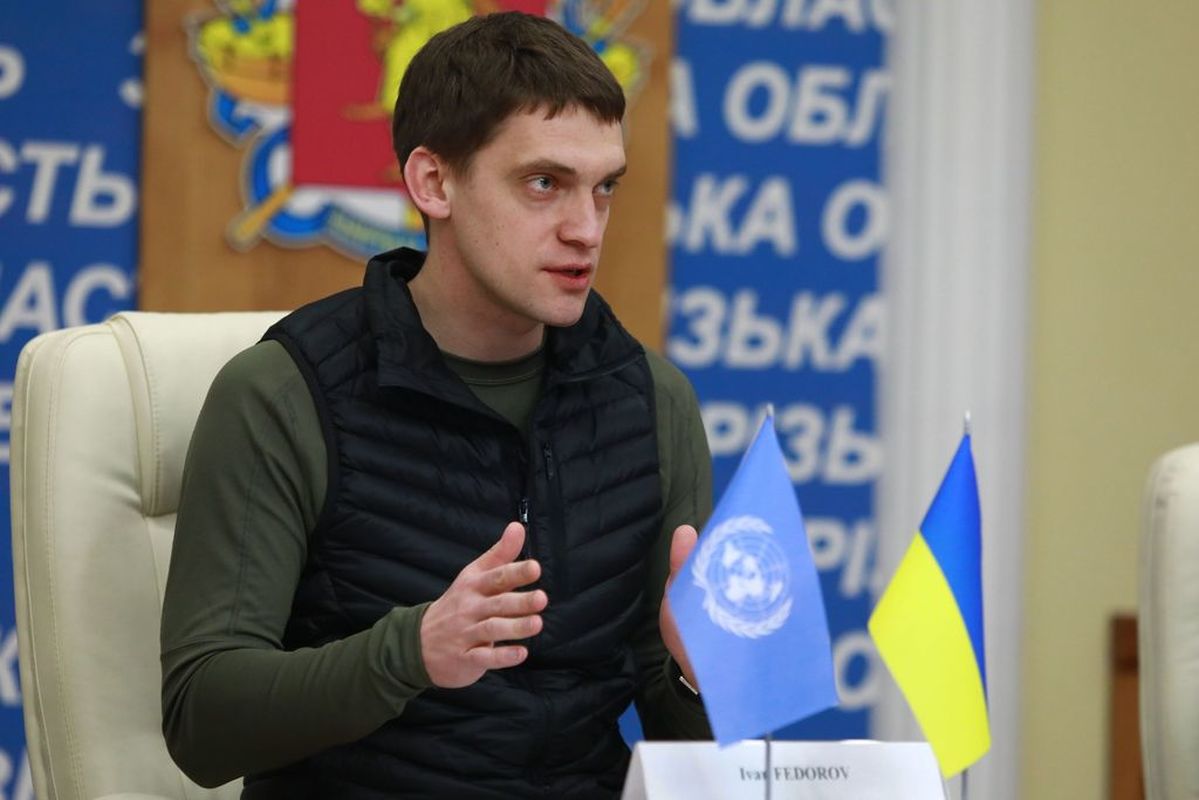
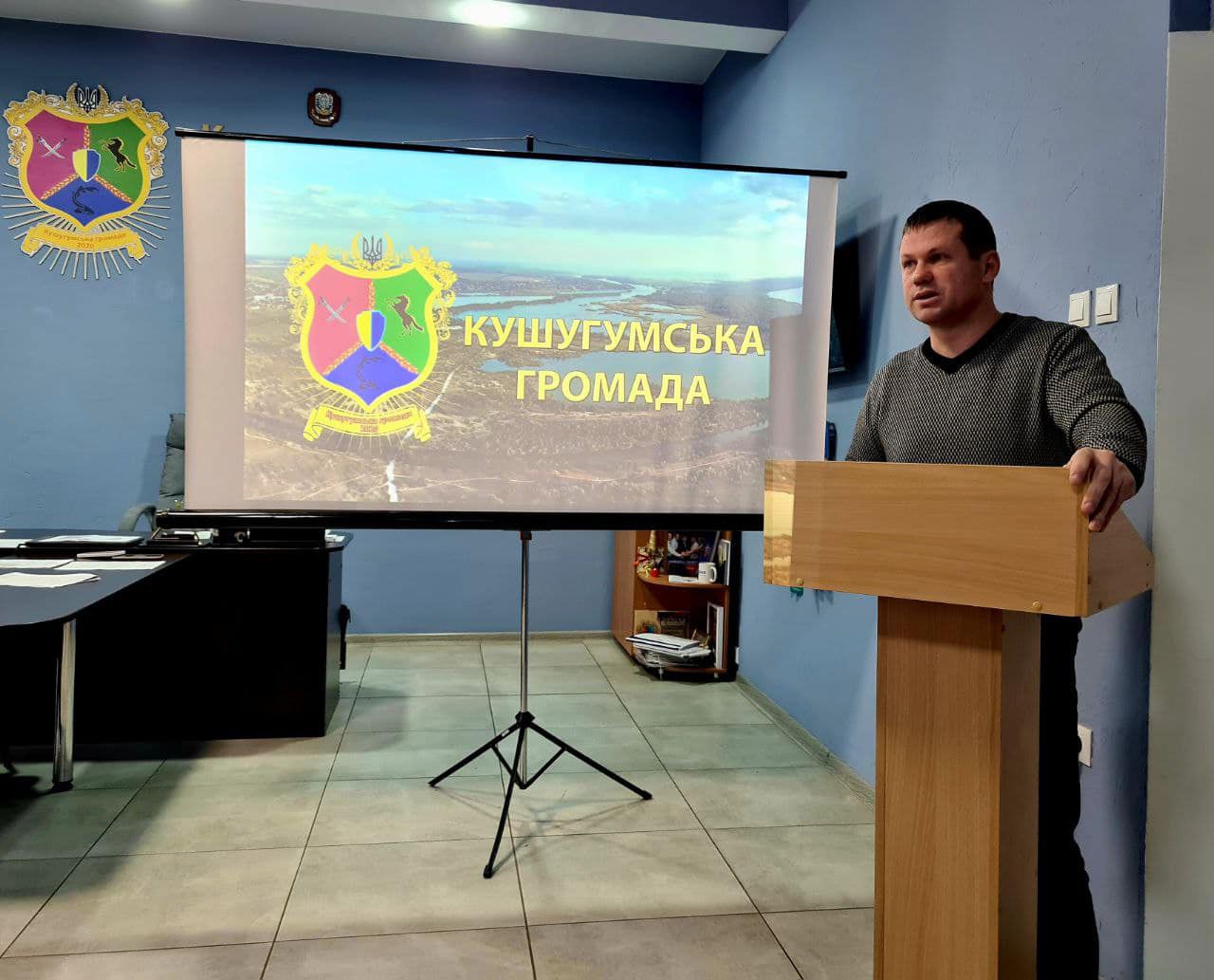
“We have decided to support our defenders in every way possible. We have already purchased drones, thermal imagers, and rangefinders. We plan to deliver them to the units that were registered in our community. They are operating on the front lines in the Zaporizhzhia oblast. We believe in our Armed Forces and want to help them”, - says Volodymyr Sosunovskyi, the head of the Kushuhum Territorial Community.
At the same time, the community continues to live and strive for development. Notably, one of the six underground schools, which are set to open in the Zaporizhzhia oblast by the end of this year, is being built on its territory.
“In the Kushuhum community, we are constructing an 'underground school' — a radiation shelter where 1,000 children can study in two shifts. The foundation is already being laid, and there is still a lot of work ahead that must be completed on time”, - said Ivan Fedorov.“This school will not only serve the local community's children. With the school buses currently being purchased, we will be able to transport students from other settlements for education”.
The cost of construction to ensure the safe education of schoolchildren is 108 million hryvnias. The work is funded by the state budget with co-financing from local funds.
The Shyroke community is taking care of the well-being of its citizens and their mental health
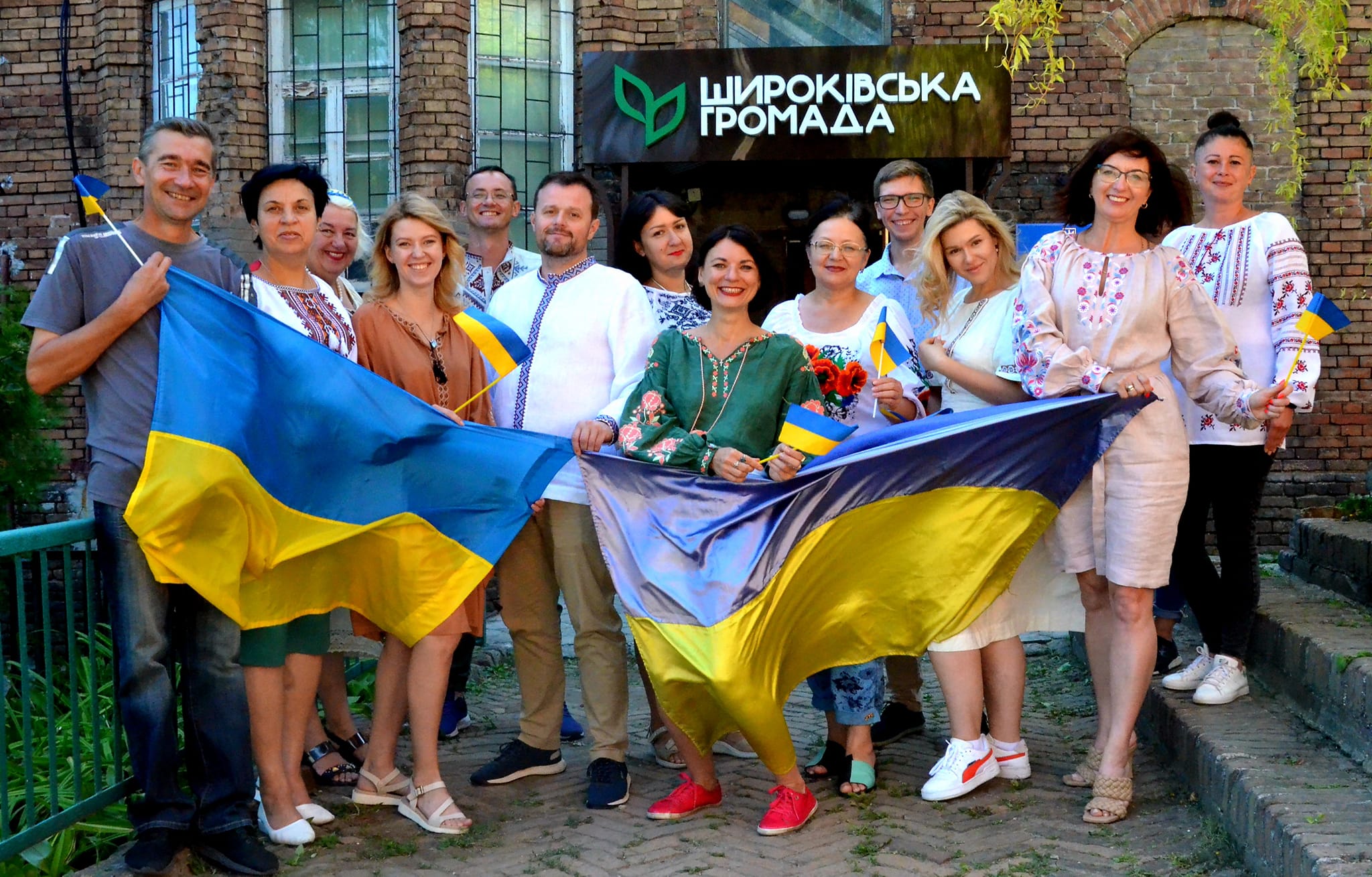
At the latest session of the Shyroke Territorial Community Council, three and a half dozen urgent issues related to the community's livelihood were resolved. One of the top priorities is supporting the military. The council allocated funds for the purchase of drones and other equipment at the request of the combat units that submitted corresponding requests to the community.
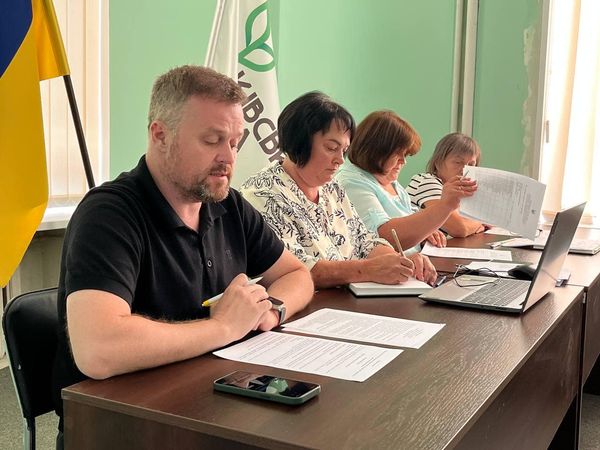
"In addition, we are doing a lot in the community for veterans, female veterans, and their families — including financial payments, mental health support, adaptation programs, the work of a Veteran's Assistant, and more. We have compiled all these activities into a single Support Program for the Defenders of Ukraine and unanimously approved it at a session", - said the head of the territorial community, Denys Korotenko.
The mental health of the community's residents is an important part of the work of the local management team.
"We understand that the full-scale war is a constant source of stress for everyone. We are actively combating the stigma in our community that going to a psychologist is something negative. We are creating centers where residents can receive such help and consult a specialist about their condition", - noted the head of the community.
New opportunities in this direction were provided to the community through participation in the nationwide mental health program 'How Are You?' led by the First Lady, Olena Zelenska. Recently, the program consultant in the community, Dmytro Lukianenko, conducted an official presentation, explaining its main tasks and mission.
"We also discussed ways to cope with stress at the workplace. Among all the options I heard about at the presentation, physical activity suits me best. That's why I regularly go to the gym. We encourage our citizens to also find a pastime that helps combat stress. Specialists at the Resilience Center can assist with this. Our Center operates in Shyroke as part of the 'How Are You?' project", - advised Denys Korotenko.
At the same time, they also find time to address daily issues, particularly regarding waste removal and water supply. The local utility company currently has almost 6 million hryvnias in total debt for these services.
"That money could potentially be used for several kilometers of new pipes in the water supply system that won't break, or for several new garbage bins in one of the villages in our community. I urge all residents who have outstanding debts to pay their utility bills. It is our collective responsibility to improve and enhance our living conditions", - appealed the Shyroke community head.
The community has already established its own good traditions. In particular, Denys Korotenko, regularly holds traditional meetings with the believers of the community. Recently, an August prayer breakfast was held there.
"Thank you to the guests and attending colleagues for the new spiritual lessons that each of us received today. We discussed, in particular, the consequences of our actions and inactions. In today's realities, when the future of the country and the well-being of citizens depend on the actions of every individual, I believe we must act. Help one another, support the military, take care of the place you live, build, develop, and put in the effort. And since we live in wartime conditions, we must do twice as much and work confidently for the future. That is what faith in our Victory is", - noted Denys Korotenko.
Amidst continuous ruin in Orikhiv, people are uniting and setting examples of profound humanity
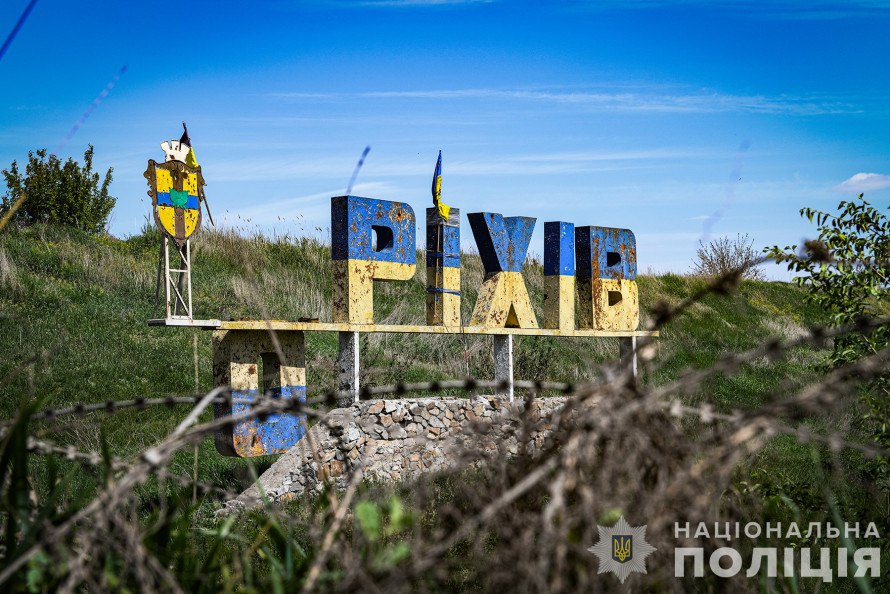
Every day, russian military forces shell Orikhiv in the Polohy district of the Zaporizhzhia oblast, located 9 kilometers from the front line, using various types of weapons. The enemy failed to capture this resilient city and, unfortunately, is turning it into a complete ruin. The empty streets are littered with craters and debris from russian munitions, broken asphalt on the roads, and destroyed houses, schools, and kindergartens.
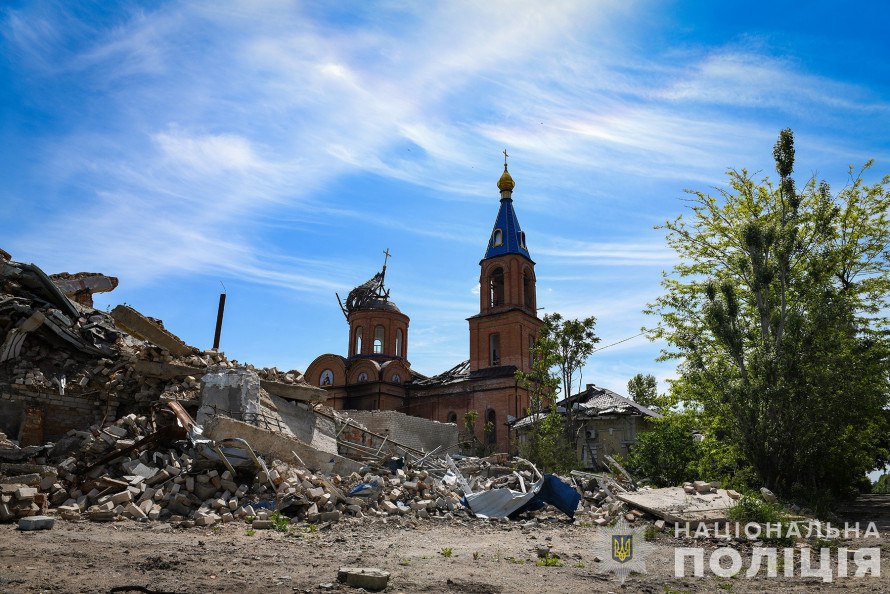
Before the full-scale invasion, about 13,000 people lived in Orikhiv. The vast majority have left. Some still come back to tend their gardens and patch up holes in their roofs after the latest enemy attacks, only to quickly return to safer settlements.
Currently, there are about half a thousand residents remaining in the city. When the shelling starts, they hide, and once the enemy attack subsides, they come out to clean up their yards. Out of habit, they work in their gardens, but more often than not, instead of vegetables, they harvest pieces of metal debris from russian shells.
67-year-old Viktor Zinchenko, a resident of front-line Orikhiv, stays here permanently because he takes care of about fifty goats that people from almost the entire city have given to him. Now in the third year of the full-scale war, he grazes the goats near his house daily, searches for food for them, and dedicates all his time to them. His story was shared by Suspilne.
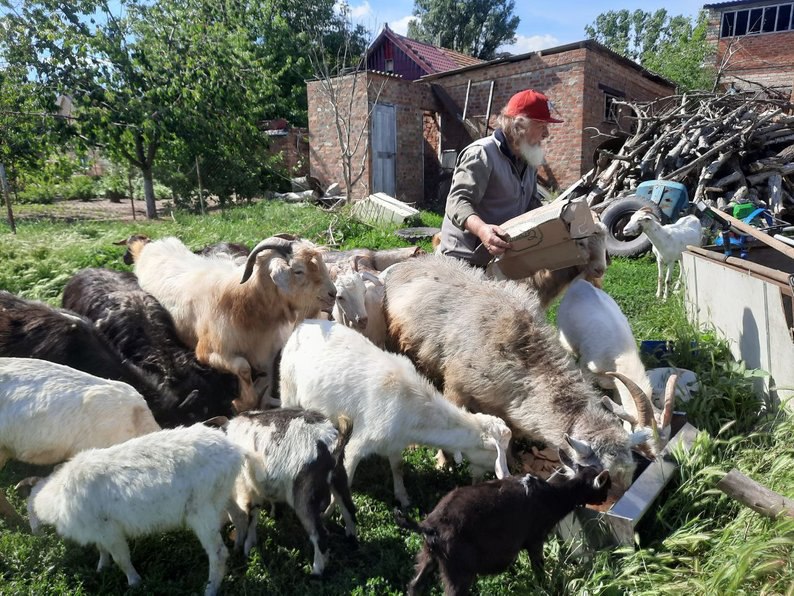
Viktor mentioned that the goats are almost his only comfort, and it's because of them that he remains in the front-line city. He also noted that the goats can sense the threat of shelling. Therefore, he pays attention to the animals' behavior and, in case of danger, hides with them in the basement.
"They sense the bombs. They're eating, grazing, and then suddenly — they go quiet, no one chews or eats anything. I hear the jet sound, and they start running, so I run after them", - the pensioner shared.
Three months ago, russian forces struck Viktor's yard with a cluster munition. The blast damaged his house and killed four goats and six kids. He doesn’t want to give the animals away because they’ve become like family to him.
The Main Directorate of the National Police in the Zaporizhzhia oblast spoke about the work of the police in this city. The officers help local residents, document the aftermath of enemy shelling, and collect evidence to hold the russian military accountable.
"Orikhiv has already become a second Bakhmut, but no russian soldier has set foot here yet. However, the city is almost completely destroyed", - notes Artem Arabadzhy, the head of the Department for Investigating Crimes Committed in Armed Conflict Conditions of the Investigative Department of the National Police in the Zaporizhzhia oblast.
Every day, the police receive reports from residents of the Orikhiv community about property destroyed by enemy shelling. They respond to impact sites, take videos and photos of the aftermath, talk to the affected people, and provide necessary consultations and assistance. They document all military crimes without exception—so that every russian occupier is brought to justice.
One of the civilian residents of Orikhiv affected by the enemy shelling is 78-year-old Hanna Prokopivna. She lives alone; her children left the city before the full-scale invasion and now work and help remotely.
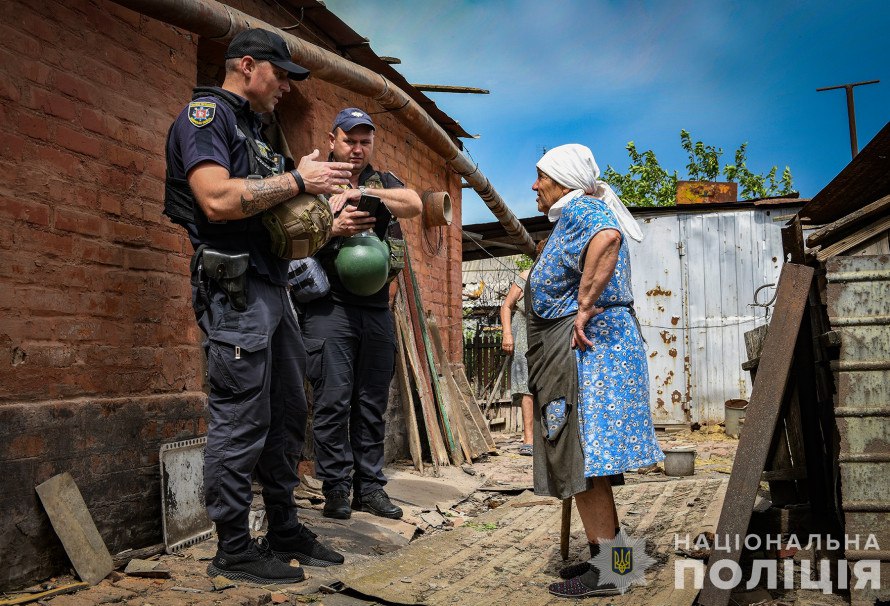
Her house has been repeatedly damaged by russian shells. Recently, it was hit again. After the explosions, when Hanna Prokopivna went outside, she saw two craters in her garden, broken trees, shattered windows, a damaged roof and porch, and scarred walls. Fortunately, her birds and pets survived—her only "comfort" and joy as a solitary woman. For her neighbors, a shell hit directly into their house.
On the same day, police officers visited the woman, documented the damage, prepared a damage report, provided advice on compensation and home repair, and brought humanitarian aid and drinking water.
The State Emergency Service units in Orikhiv and other frontline towns also assist local residents—not only by dealing with the aftermath of emergencies, including enemy shelling, but also by delivering technical and drinking water, bread, other food products, and medicines.
Life goes on, and life prevails
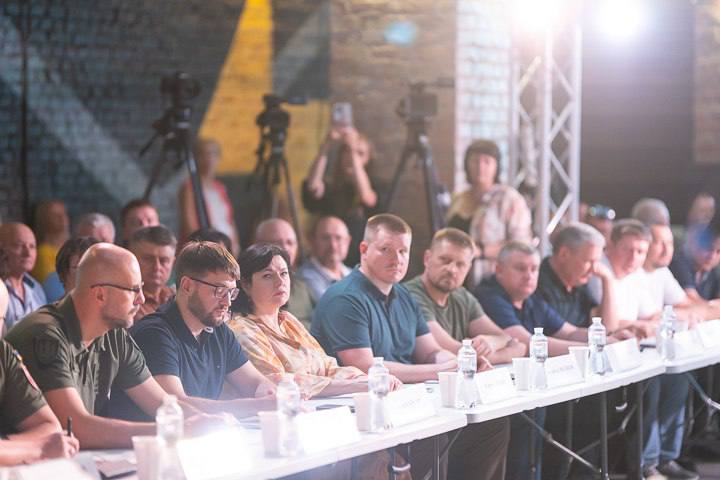
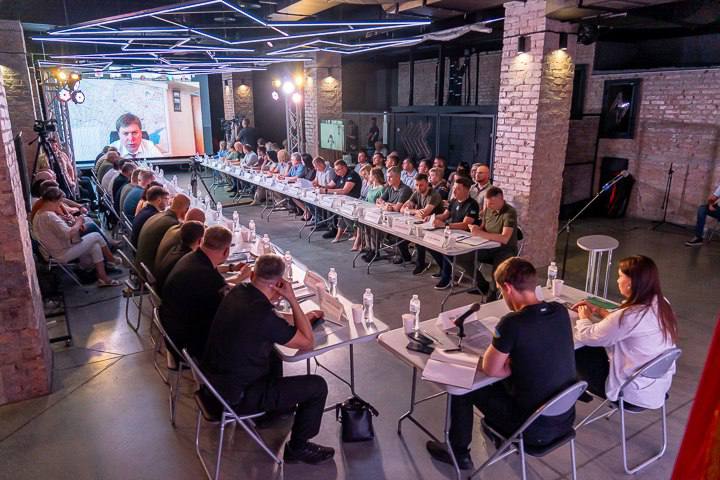
On August 2, a regional meeting of the Congress of Local and Regional Authorities under the President of Ukraine was held in Zaporizhzhia.
"We addressed the most pressing issues: support for the Defense Forces in the Zaporizhzhia direction and enhancing the safety of residents, protection and restoration of energy infrastructure and preparation for the heating season, support for farmers in frontline communities where we are building fortifications, and the introduction of safe offline education for children", - said Ivan Fedorov, head of the Zaporizhzhia Oblast State Administration.
In his Telegram channel, the OMA head also mentioned that thanks to the assistance of international humanitarian partners, tenders for the procurement of generation and cogeneration equipment can be held. The tender for the first three cogeneration units of 7.5 MW has already been completed. Tenders for another eight units will soon be finished, and proposals for donors for three more boiler houses are on the way.
The water utility announced a tender for the purchase of two diesel generators for stations supplying water across the Zaporizhzhia and part of the Dnipropetrovsk oblasts. The tender will last several weeks, and the delivery of the generators is expected within two months.
"At the same time, we are providing socially important facilities with alternative energy sources. We are installing uninterruptible power supplies on traffic lights and preparing to install solar panels in medical and educational institutions", - added the OMA head. "Additionally, we are exploring ways to help homeowners' associations and businesses with the procurement of generation equipment and working with banks on compensation programs for loan interest rates".
Nataliia Zvoryhina, Zaporizhzhia, for Ostrov




